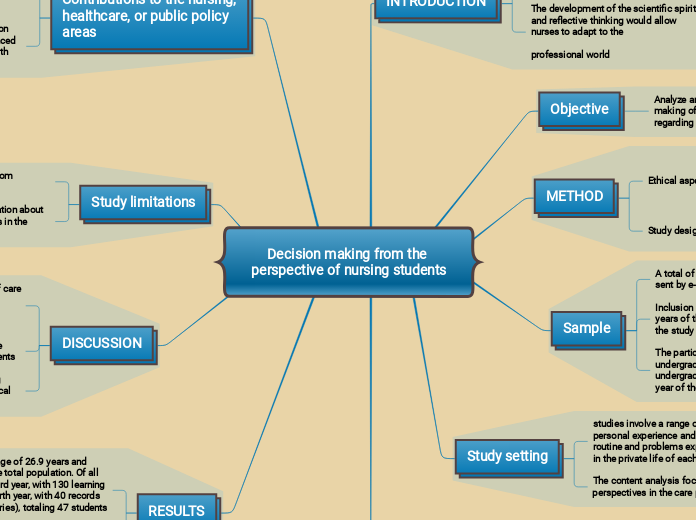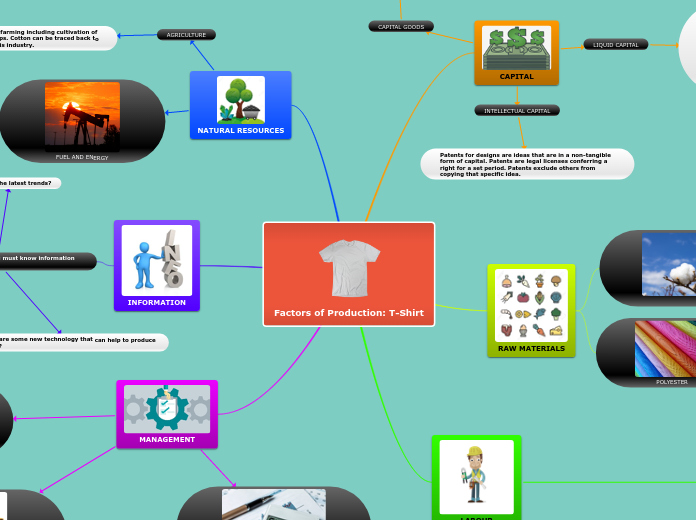Decision making from the perspective of nursing students
The part of speech is a category to which a word is assigned according to its syntactic functions. In English the main parts of speech are noun, pronoun, adjective, determiner, verb, adverb, preposition, conjunction, and interjection.
RESULTS
A conjunction is a word like 'if' 'but' or 'and' which is used to connect sentences or clauses together.
The authors categorize six decision-making types: intervention; targeting; timing; communication; management; and understanding, which were used in an analysis of the learning diaries and field notes.
The 614 students presented a mean age of 26.9 years and
459 were women, that is, 74.8% of the total population. Of all
participants, 37 were attending the third year, with 130 learning
diaries, and 10 were attending the fourth year, with 40 records
(including field notes and learning diaries), totaling 47 students
and 170 records
Subordinating conjunctions are conjunctions that are used at the beginning of subordinate clauses. Some examples of these conjunctions are: although, after, before, because, how, if, once, since, so that, until, unless, when etc.
The study of the decision-making typology that the students
described in their records was based on the categorization of
Thompson and Stapley
DISCUSSION
A preposition is one of the most exciting parts of grammar. A preposition is used to describe the location of something in relation to something else.
Nursing students have expectations of showing decisionmaking skills during their educational process, more specifically in clinical practice
When a preposition consists of more than one word, it is called double preposition.
into, within, upto etc.
At the professional level, nurses are increasingly required to have decision-making skills to provide safe and effective care to patients
Compound preposition consists of two or more words.
on behalf of, according to, in front of, from across, etc.
Teaching how to decide must meet the increasing complexity of care
contexts and promote students’ ability to reason about changes
in clinical situations, considering the context and centrality of
patients and families in the care process.
When a preposition consists of one word it is called single or simple preposition.
Study limitations
An adverb is used to describe a verb, but it can also describe an adjective or another adverb.
Adverbs normally help paint a fuller picture by describing how something happens.
2: Lack of participant observation about how students made decisions in the clinical context
1 : Lack of oral information from students
Contributions to the nursing, healthcare, or public policy areas
A numeral is a word or phrase that describes a numerical quantity.
Some theories of grammar use the word 'numeral' to refer to cardinal numbers that act as a determiner to specify the quantity of a noun, for example the 'two' in 'two hats'.
Knowing the response forms of students’ decision making in the face of clinical situations experienced enables the promotion of a pedagogical work with worthwhile learning.
if schools’ curricula provide the necessary means to facilitate decision-making development and if students are encouraged to participate in every decision-making type.
Data analysis
The internal researcher inductively through reflection, on the data to develop the learning description of the decision making of the students in the care process
Students' learning journals and field notes were categorized
Study setting
An article is a word used to modify a noun, which is a person, place, object, or idea. Technically, an article is an adjective, which is any word that modifies a noun.
The content analysis focused on the students’ perspectives in the care process, rather than care itself
Indefinite articles are the words 'a' and 'an.' Each of these articles is used to refer to a noun, but the noun being referred to is not a specific person, place, object, or idea. It can be any noun from a group of nouns.
A car in the parking lot.
studies involve a range of empirical material, such as personal experience and introspection, describing daily routine and problems experienced, as well as their meanings in the private life of each participant
It refers directly to a specific noun or groups of nouns.
The breakfast on my plate.
Sample
A pronoun is a word that can be used in place of a noun, typically after the noun itself has already been stated.
The participants were identified as 3S (students attending the third year of the undergraduate nursing course) and 4S (students attending the fourth year of the undergraduate nursing course), plus a number according to the order of invitation and year of the undergraduate course
Demonstrative pronouns are used to demonstrate (or indicate). This, that, these, and those are all demonstrative pronouns.
This, These
Inclusion criteria were: students attending clinical training of the third and fourth years of the nursing undergraduate course and agreeing to voluntarily participate in the study
Possessive pronouns are used to show possession. The possessive pronouns are mine, yours, his, hers, ours, and theirs.
A total of 614 students were recruited through a request
sent by e-mail. Of these, 47 students replied.
The personal pronouns are I, you, he, she, it, we, they. More often than not (but certainly not always), they replace nouns representing people.
METHOD
An adjective is a word that's used to describe a specific noun and to provide more detail to the listener.
Study design
Superlative adjectives demonstrate a higher level of comparison between entities.
This was a qualitative study, with an exploratory and descriptive analysis
It was carried out based on the case study with the research methodology trying to give answers to how? because?
The author tried to understand how the nursing students will be structured in the face of decision-making in the projected case.
Data collection, data review and document analysis that can complement this study
Ethical aspects
Expresses a comparison between two entities or groups of entities in quality or degree.
Study approved by the presidency of the Lisbon Nursing School, with the prior authorization of the students who decided to participate and the signature of consent was not required.
Objective
A noun is defined as a person, place, thing or idea. Proper nouns always begin with a capital letter. Common nouns, which are general words, such as 'cars,' are not capitalized.
Analyze and understand the decision-making of some high school students regarding the nursing care process
Compound nouns are words where two nouns have been stuck together to make a new noun. Compound nouns should be written as one word, without a hyphen.
Create sentences
Candlestick
INTRODUCTION
A verb is an action word or 'doing' word that signifies movement in some way.
The development of the scientific spirit
and reflective thinking would allow nurses to adapt to the
professional world
An auxiliary verb helps the main (full) verb and is also called a 'helping verb.' With auxiliary verbs, you can write sentences in different tenses, moods, or voices.
Nursing care provided to patients, families and communities
it will only be possible through a decision-making approach
this is effective when: 1, In the initial phase of education, students are taught to make nursing diagnoses and carry out appropriate interventions according to the needs of the patient. 2, The clinical training is where the decision-making process is acquired, looking for evidence and concepts for the construction of giving the right process for the patient.
The recognition of the nurse as a decision-making element was
certified by the Portuguese Nurses Association









